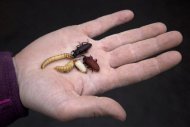By Catherine Hornby
ROME (Reuters) - The thought of eating beetles, caterpillars and ants may give you the creeps, but the authors of a U.N. report published on Monday said the health benefits of consuming nutritious insects could help fight obesity.
More than 1,900 species of insects are eaten around the world, mainly in Africa and Asia, but people in the West generally turn their noses up at the likes of grasshoppers, termites and other crunchy fare.
The authors of the study by the Forestry Department, part of the U.N. Food and Agriculture Organization (FAO), said many insects contained the same amount of protein and minerals as meat and more healthy fats doctors recommend in balanced diets.
"In the West we have a cultural bias, and think that because insects come from developing countries, they cannot be good," said scientist Arnold van Huis from Wageningen University in the Netherlands, one of the authors of the report.
Eva Muller of the FAO said restaurants in Europe were starting to offer insect-based dishes, presenting them to diners as exotic delicacies.
Danish restaurant Noma, for example, crowned the world's best for three years running in one poll, is renowned for ingredients including ants and fermented grasshoppers.
As well as helping in the costly battle against obesity, which the World Health Organization estimates has nearly doubled since 1980 and affects around 500 million people, the report said insect farming was likely to be less land-dependent than traditional livestock and produce fewer greenhouse gases.
It would also provide business and export opportunities for poor people in developing countries, especially women, who are often responsible for collecting insects in rural communities.
Van Huis said barriers to enjoying dishes such as bee larvae yoghurt were psychological - in a blind test carried out by his team, nine out of 10 people preferred meatballs made from roughly half meat and half mealworms to those made from meat.
(Reporting by Catherine Hornby; Editing by Philip Pullella and Mike Collett-White)













